Egg size and colour chart by chicken breed.
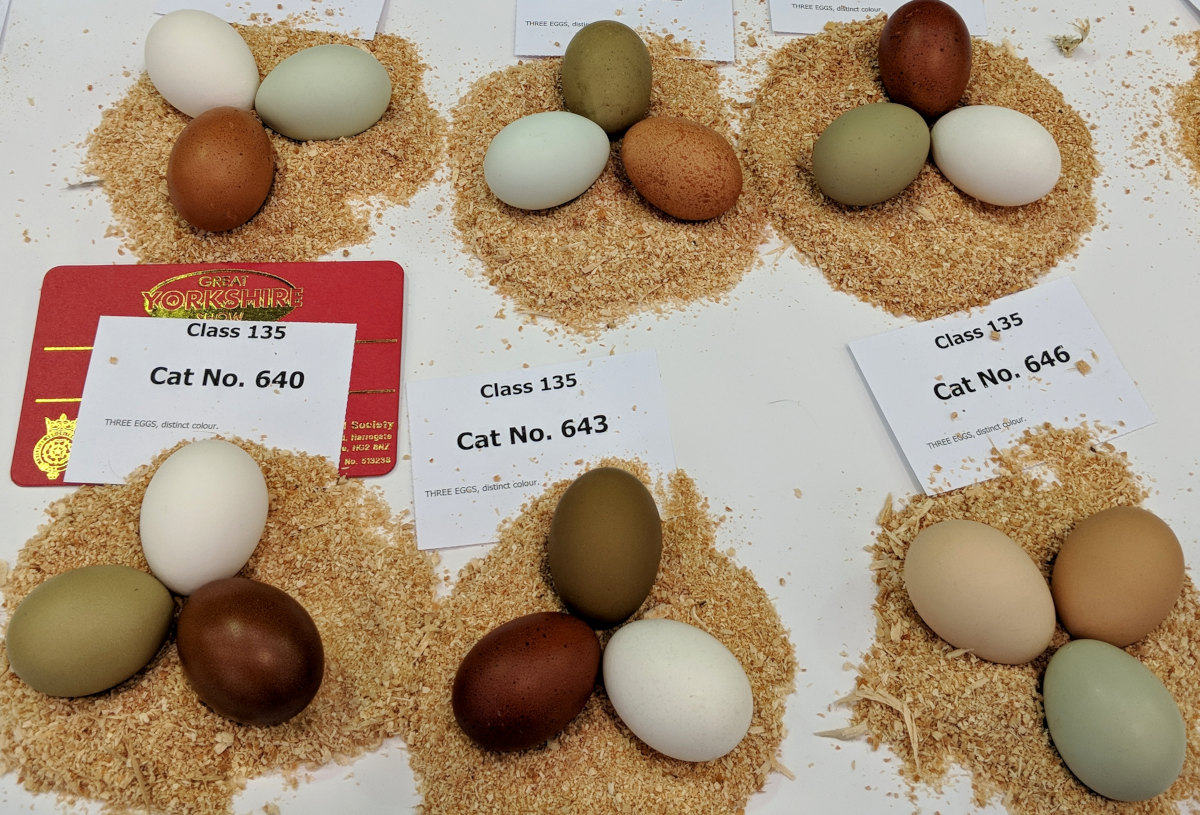
Egg colour is hugely subjective and often the source of much disagreement among chicken keepers. A friend and I often disagree over eggs I would call cream but he reckons are brown.
Table of Contents
- What are the different colours of chickens eggs?
- Which chickens lay which colour eggs?
- Egg colour chart for all chicken breeds with images and productivity:
- What is the rarest colour of chickens egg?
- Can one chicken lay different coloured eggs?
- How to tell what colour eggs a chickens will lay?
- Does the diet effect the shell colour of eggs?
Like every other egg laying animal the shell colour of a chickens egg is the product of hundreds of thousands of years of evolution. Although they had a common ancestor the green and blue egg layers are very different from the chickens we know of that descended from the jungle fowl of Asia.
The colour of egg a chickens lays is entirely determined by the genetics of the bird and is inherited from one generation to the next. Chickens lay different colour eggs through selection, either of shell colour, pigment or both.
Egg colours can be mixed by cross breeding chickens. Olive eggers for example are a cross between chickens that produce an egg with a green shell and brown pigment.
I have noticed when breeding chickens that the egg colour follows the dam or female line except for blue and green so the dark component should be supplied by the hen.
What are the different colours of chickens eggs?
There is no difference in the egg or it's contents, only in the colour of the shell. In a blind taste test none of my friends or family could tell the difference between any eggs they were given.
The colour of a chicken's earlobes can also give you a clue about the colour of eggs they will lay. Hens with white earlobes typically lay white or lightly tinted eggs, while hens with red earlobes most commonly lay brown eggs. However, there are always exceptions to these rules.
- Green: A cross between a brown egg layer and a blue egg layer will lay a green egg.
- Olive: Olive eggs are a cross between dark brown and blue.
- Brown: The standard store bought mid brown egg laid by red sex links.
- Dark brown: Birds like Marans have been specially selected to have a deep chestnut brown colour.
- White: White is the basic colour of all egg shells and is merely lacking in pigments.
- Blue: The shells of blue eggs are coloured with the pigment oocyanin, which permeated the shell.
- Cream : Cream egg are light brown.
- Tinted or Ivory: Tinted or Ivory eggs have a very thin layer of pigment over the egg shell.
- Pink: The pink colour on eggs shells is caused by the bloom or cuticle which is a natural coating that covers the egg and seals the pores.
- Purple: Purple eggs are similar to pink but have a darker shade of brown under the bloom. Purple eggs are not breed specific and are only produced by a dark egg layer with a heavy bloom.
- Grey or charcoal: Grey eggs have a charcoal colour of various shades.
- Speckled: Speckled eggs are produced by any hen that lays an egg with colour. If the egg rotates too slowly in the oviduct it comes out speckled.
The colour of a chicken's eggs does not affect their nutritional value. All eggs are a good source of protein, vitamins, and minerals. So, whether you prefer white, brown, blue, green, or pink eggs, they are all equally healthy.
Which chickens lay which colour eggs?
The colour of the egg is the result of pigments being deposited during or after shell formation inside the oviduct of the chicken.
Egg colour is genetic and can vary between hens of the same breed and even from the same hen over the course of a laying season. My Barnevelder eggs get lighter towards the end of summer and different birds of the same breed can lay slightly different eggs.
Here are some of the most common chicken breeds and the colour of eggs they lay:
- White: Leghorns, Anconas, Andalusians, Hamburgs, Polish
- Brown: Rhode Island Reds, Australorps, Barred Plymouth Rocks, New Hampshires, Welsummers, Buff Orpingtons
- Blue: Ameraucanas, Cream Legbars, Easter Eggers
- Green: Olive Eggers
- Pink: Araucanas
There are also some chickens that lay eggs with a combination of colours, such as the Marans, which lay dark brown eggs with a reddish tint.
Below: Here is a grey egg amongst a selection of other colours. It's not a trick of the light or photo-shopped and was laid by an Araucana cross Cream Legbar owned by Magners farm, Fethard, Co. Tipperary Ireland.
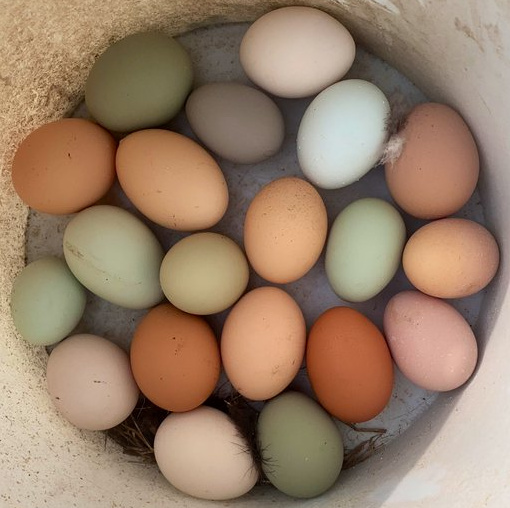
Please bear in mind that this is a general guide and there is a great deal of variation between hens of the same breed.
All egg shells are made from calcium carbonate and are either white or blue with all other colours being produced by various shades of pigments laid down on the surface of the egg as it is being made.
If you use a scouring pad you can actually wash the colour off a brown egg but not a green or blue one!
Skin colour and feather colour in chickens is not linked in any meaningful way to egg shell colour. Both are characteristics that can be passed down and selected for in breeding but a white skinned bird will not lay a white egg for example. It might but may just as easily lay a brown egg.
The brown pigment that is laid down on the surface of the egg is called protoporphyrin IX, which is an iron compound similar to the haemoglobin in your blood.
Egg colour chart for all chicken breeds with images and productivity:
I have been attending poultry shows for many years and kept some of these breeds myself
| Breed of hen | Egg shell colour | Egg image | Egg size | Productivity |
|---|---|---|---|---|
| Altsteirer | White / Ivory. | 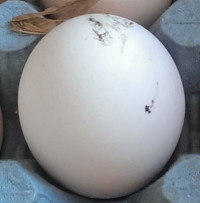 | Large. | 180 / 200 eggs per year. |
Ameraucana | Light blue. | 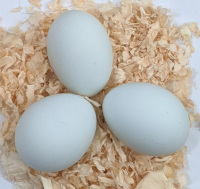 | Medium. | 150 / 180 eggs per year. |
| Ancona | White. | 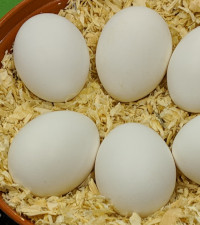 | Large. | 240 / 260 eggs per year. |
| Andalusian | White. | 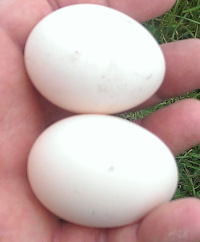 | Large. | 220 / 240 eggs per year. |
| Appenzeller Spitzhauben. | White | 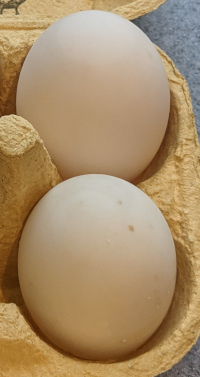 | Large. | 180 / 200 eggs per year. |
| Arucuana. | Blue / Blue-green. | 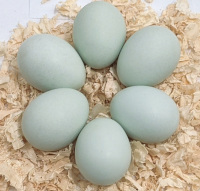 | Large. | 150 / 180 eggs per year |
| Asil / Aseel. | Tinted /Cream / Light brown. | 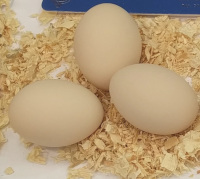 | Medium. | 40 to 70 eggs per year. Very seasonal layers. |
| Augsburger. | White. | 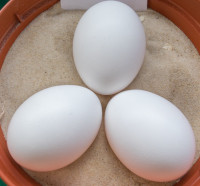 | Large. | 150 / 180 eggs per year. |
| Ayam Cemani. | White. | 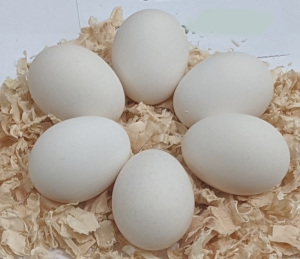 | Small. | 70 to 90 eggs per year. |
| Barnevelder. | Dark Brown. | 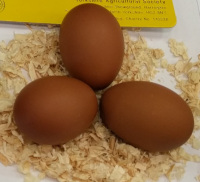 | Large. | Mine laid and average of 186 in their first year. |
| Black Rock . | Brown. | 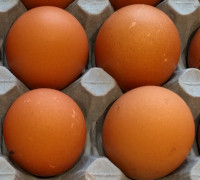 | Large. | 260 /260 eggs per year. Colour fades over the season and the years. |
| Booted Bantam. | White / Tinted. | 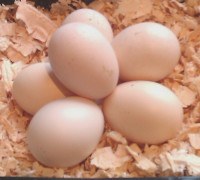 | Small. | 100 / 120 eggs per year. |
| Bovans Hybrids. | Brown. | 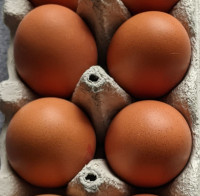 | Large. | 260 / 290 eggs per year. |
| Brabanter. | White. | Large. | 140 / 160 eggs per year. | |
| Brahma. | Tinted / Brown. | 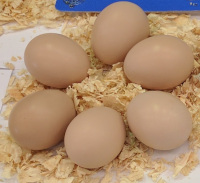 | Large. | 140 / 160 eggs per year. |
| Brakel. | White. | Small. | 180 eggs per year. | |
| Breda | Cream / White. | Medium. | 160 to 180 eggs per year. | |
| Bresse. | White. | 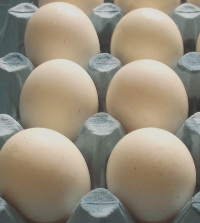 | Large. | 160/180 eggs per year. Highly seasonal layers. |
| Burford Brown | Brown. | 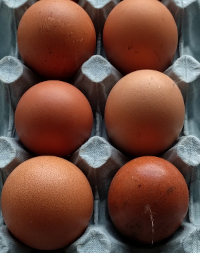 | Large. | 160 / 180 eggs per year. |
| Campine. | White. | 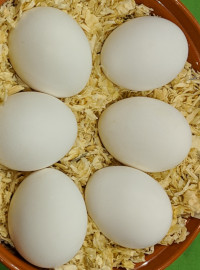 | Medium. | 150 to 170 eggs per year. |
| Cinnamon Queens. | Brown. | 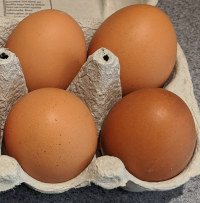 | Large. | 260 / 280 eggsper year. |
| Cochin. | Cream / Light brown. | 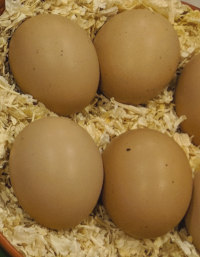 | Medium. | 160 eggs a year. |
| Cream Legbar. | Blue-green. | 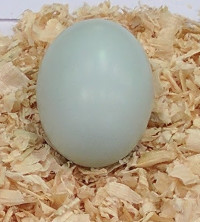 | Large. | 160 / 180 eggs per year. |
| Crevecoeur. | White. | 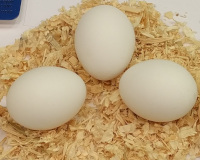 | Medium. | 120 eggs per year. |
| Croad Lansghan. | Brown / Pink or purple depending on bloom. | 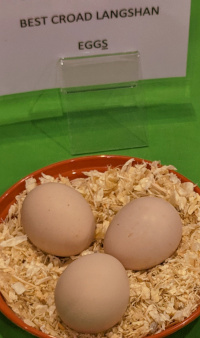 | Large. | 140 to 160 eggs per year. |
| Derbyshire Redcap. | White. | 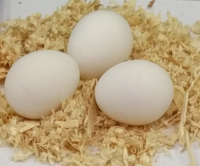 | Large. | 200 eggs per year. |
| Dominique. | Brown. | 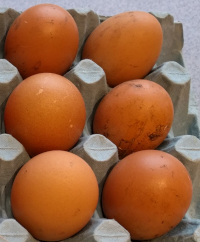 | Large. | 220 / 240 eggs per year. |
| Dorking | White / Tinted. | 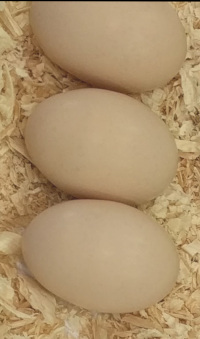 | Medium. | 140 /150 eggs per year. |
| Dutch Bantam | White / cream. | 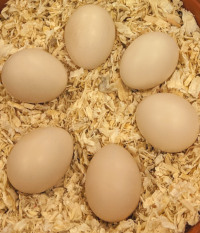 | Small. | 140 / 160 eggs per year. |
| Easter eggers. | Green / blue / Various. | 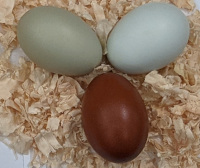 | Large. | 180 / 200 eggs per year. |
| Faverolles. | Light brown / pink. | Medium. | 220 /240 eggs a year. | |
| Fayoumi. | Cream / Tinted. | Medium. | 150 eggs per year. | |
| Friesian | White. | Small. | 220 eggs per year. | |
| Frizzle. | White / Tinted. | Small. | 120 to 140 eggs per year. | |
| German bush fowl. | Green. | 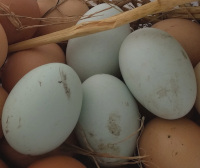 | Medium. | 160 to 180 eggs per year. |
| German Langshan. | Brown | 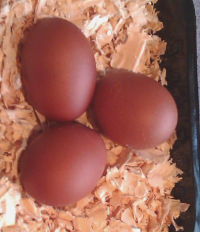 | Large. | 180 eggs per year. |
| Golden comets. | Brown. | 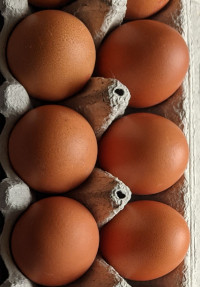 | Large. | 240+ eggs per year. |
| Gold tops. | White / cream. | 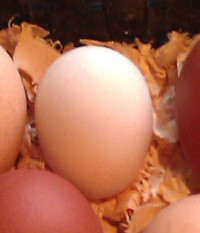 | Small. | 120 / 140 eggs per year. |
| Hamburg. | White. | Medium. | 140 eggs per year. | |
| Houdan. | White. | Medium. | 150 eggs per year. | |
| Hy-Line. | Brown. | 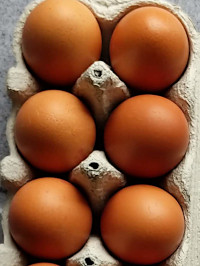 | Large. | 240 / 260 eggs per year. |
| Indian (Cornish) Game. | Brown / light brown. | Small. | 160 / 180 eggs per year. | |
| ISA Brown | Brown. | 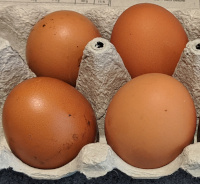 | Large. | 240 / 260 eggs per year. |
| Ixworth. | Cream / Tinted. | Medium. | 240 / 260 eggs per year. | |
| Japanese Bantam. | Cream /Tinted. | 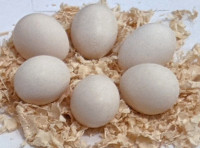 | Small / tiny. | 100 to 140 eggs per year. |
| Jersey Giant. | Brown /Light brown. | Large. | 240 / 260 eggs per year. | |
| Ko-Shamo. | Light brown. | Small. | 140 / 160 eggs per year. | |
| Kraienkoppe. | Cream / Tinted. | Medium. | 200 eggs per year. | |
| Lakenvelder. | White. | 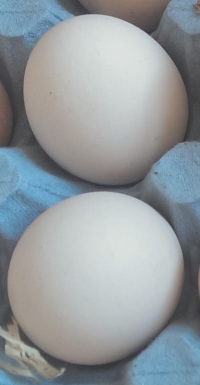 | Medium. | 150 to 170 eggs per year. |
| Leghorn. | White. | 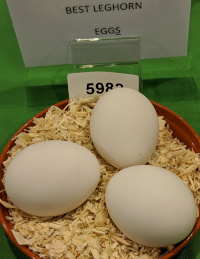 | Large. | 260 / 280 eggs per year. |
| La Fleche. | White. | Large. | 150 /160 eggs per year. | |
| Lohmann Brown. | Brown. | 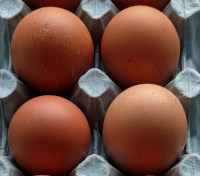 | Large. | 260 / 280 eggs per year. |
| Malay. | Light brown / Cream. | Medium. | 120 eggs per year. | |
| Marans. | Very dark brown. | 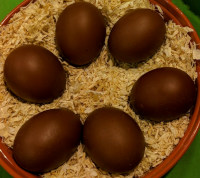 | Large. | 140 / 160 eggs per year. |
| Marsh Daisy. | Tinted / Cream. | Small. | 220 to 250 eggs per year. | |
| Minorca. | White. | Large. | 120 to 160 eggs per year. | |
| Modern Game. | White. | Medium. | 50 to 70 eggs per year. | |
| Modern Langshan. | Brown. | Medium. | 150 eggs per year. | |
| Nankin. | White / tinted. | 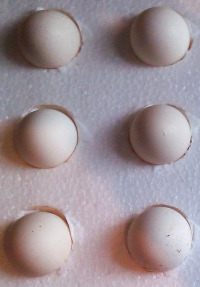 | Small. | 80 to 100 eggs per year. |
| New Hampshire Red. | Brown / light brown. | 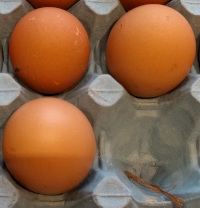 | Large. | 260+ eggs per year. |
| Norfolk Grey. | Tinted / cream. | Medium. | 200 / 220 eggs a year. | |
| North Holland Blue. | Light brown. | Large | 150 to 170 eggs a year. | |
| Old English Game. | Tinted / Cream. | 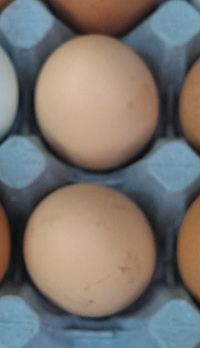 | Medium. | 150 to 170 eggs a year. |
| Old English Pheasant Fowl. | White. | 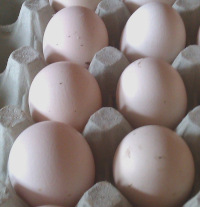 | Large. | 200 eggs a year. |
| Olive eggers. | Olive green. Various shades. | 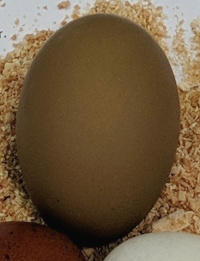 | Large. | 160 to 180 eggs per year. |
| Orpington. | Light brown. | 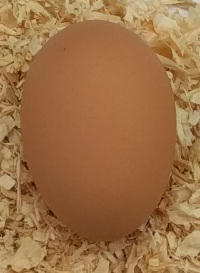 | Large. | 180 to 200 eggs per year. |
| Pekin. | Light brown. | 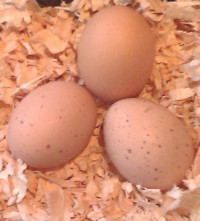 | Small. | 100 eggs per year. |
| Penedesenca | Dark brown. | 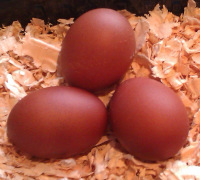 | Medium. | 150 eggs a year. |
| Plymouth Rock. | Light brown / Brown. | 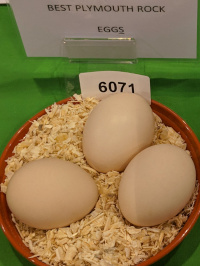 | Large. | 260 to 280 eggs per year. |
| Poland. | White. | 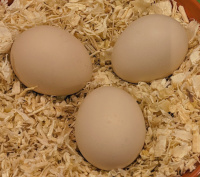 | Medium. | 200 eggs a year. |
| Rhode Island Red. | Brown. | 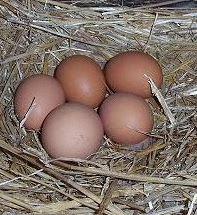 | Large. | 220 / 240 eggs per year. |
| Rhodebar. | Tinted / cream. | Large. | 200 eggs per year. | |
| Rosecomb. | White / tinted. | 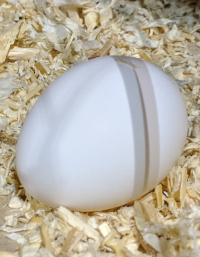 | Small. | 100 to 120 eggs a year. |
| Rumpless Araucana. | Blue. | 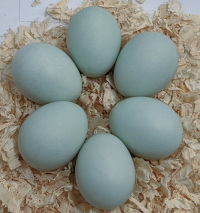 | Medium. | 160 to 180 eggs a year. |
| Rumpless Game. | Cream / Tinted. | Medium. | 160 to 180 eggs per year. | |
| Russian Orloff. | Light brown. | Medium. | 100 to 120 eggs per year. | |
| Scots Dumpy. | Cream / Tinted. | Large. | 180 eggs per year. | |
| Scots Grey. | Cream. | Large. | 140 / 160 eggs per year. | |
| Sebright. | White. | 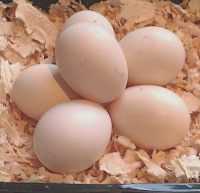 | Small. | 50 to 70 eggs a year. |
Serama | White / Light brown. | 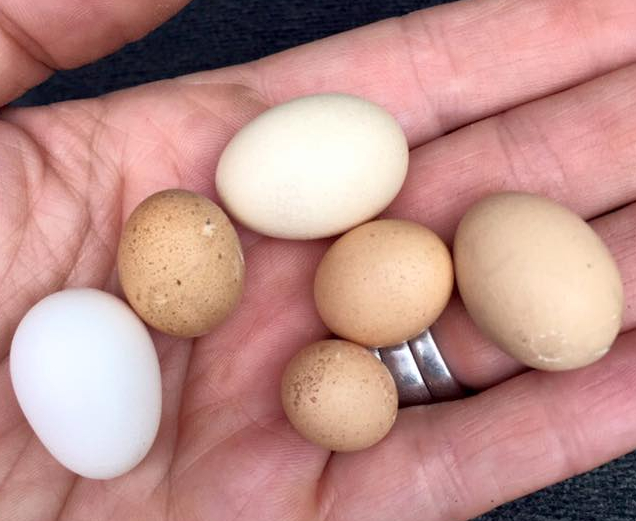 | Tiny | 50 to 70 eggs a year. |
| Shamo. | Brown. Light brown. | 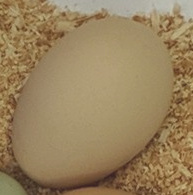 | Medium. | 80 Eggs per year. |
| Sicilian Buttercup. | White. | 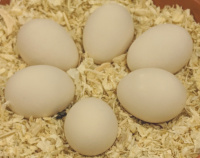 | Small. | 180 eggs per year. |
| Silkie. | Tinted / cream. | 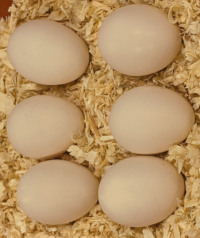 | Small. | 80 / 120 eggs per year. |
| Spanish. White faced black. | White. | 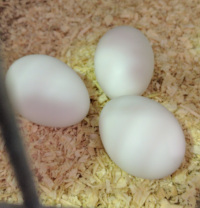 | Large | 180 eggs per year. |
| Speckledy. | Brown. | 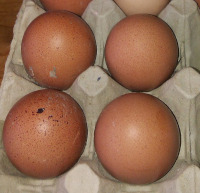 | Large. | 180 / 200 eggs per year. |
| Sulmtaler. | Cream / Light brown. | 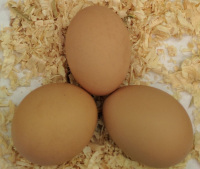 | Medium | 120 / 140 eggs per year. |
| Sultan. | White. | 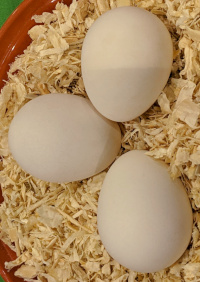 | Small. | 50 / 70 eggs per year. |
| Sumatra. | White. | 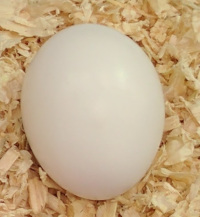 | Medium. | 100 / 120 eggs per year. |
| Sussex. | White / cream. | 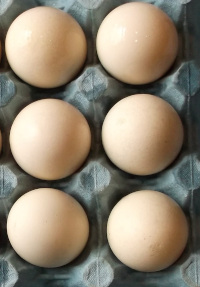 | Large. | 220 /240 eggs per year. |
| Transylvanian Naked Neck. | Cream / Light brown. | 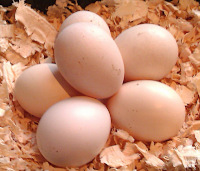 | Medium. | 100 /120 eggs per year. |
| Vorwerk. | White. | 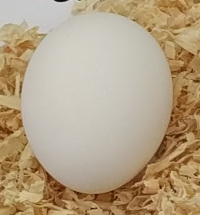 | Large. | 200 / 220 eggs per year. |
| Welbar. | Brown. | 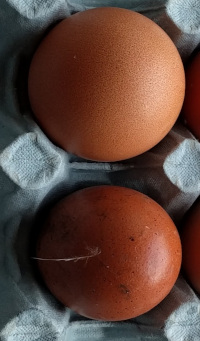 | Large. | 180 / 200 eggs per year. |
| Welsummer. | Dark Brown. | 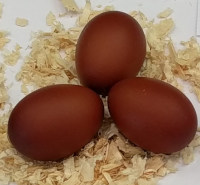 | Large | 140 / 160 eggs per year. |
| White Star. | White. | 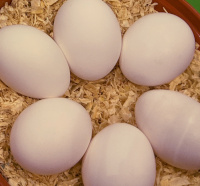 | Large. | 260 / 280 eggs per year. |
| Wyandotte. | Cream / brown. | 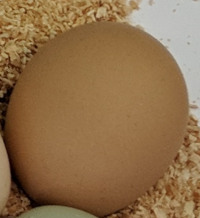 | Large. | 180 / 200 eggs per year. |
| Wybar. | Tinted. | 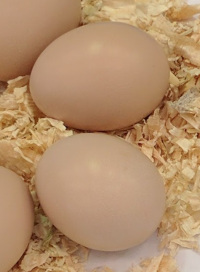 | Large. | 180 / 200 eggs per year. |
| Yokohama | White / Tinted. | 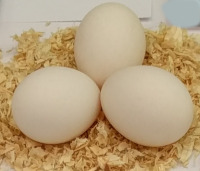 | Medium. | 80 / 120 eggs per year. |
What is the rarest colour of chickens egg?
One of the rarest colour of chicken eggs is green. Only a few breeds of chickens lay green eggs. Olive egg layers do not breed true. If you hatch from a olive egg, the resulting hen will lay either a blue or brown egg.
The Grey / Charcoal is the rarest colour of chickens egg as it can't be predicted accurately which chickens will produce the charcoal coloured egg. In more than 20 years of chicken keeping I have only had one chickens that laid a charcoal coloured egg
Below: A charcoal or grey egg.
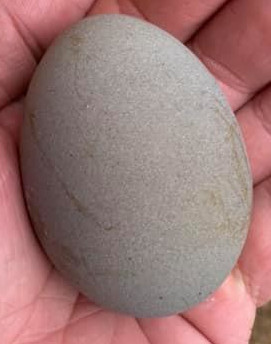
Purple eggs are rare because they are only produced by dark egg layers that produce a heavy bloom on the egg.
Below: A purple looking egg with a heavy bloom.
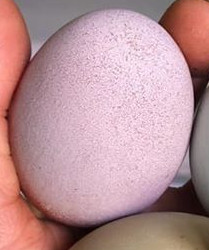
Can one chicken lay different coloured eggs?
A hen will lay the same coloured eggs day after day, chickens can't lay different coloured eggs from one day to the next unless she is sick or unwell.
A particular hens eggs will get lighter in colour as the laying season progresses.
Hens that are ill may experience a dramatic change in egg colour from one egg to the next.
Hens that lay brown eggs tend to lay fewer eggs over the year which is often why eggs in shops are white or light in colour. so if you want to save some money the go with the white variety.
How to tell what colour eggs a chickens will lay?
The colour of the earlobes of your hens will mostly, but not always tell you what colour eggs your birds will produce. Hens that have white earlobes will lay white eggs, while chickens with dark ear lobes will lay brown eggs.
The Araucana has earlobes that are a pale green or blue colour and lays blue or green looking eggs.
What you can't tell from the ear lobe is what shade of coloured eggs your hens will lay.
Does the diet effect the shell colour of eggs?
I did a long study into the eggs from backyard flocks and discovered the diet of poultry has a minimal effect on egg colour.
Egg colour fades over time both during the laying season and as the bird gets older but it is normally only a shade or two and gradual.
It certainly won't change more than a shade or two if you alter the diet.
Proper diet helps hens lay eggs with good shells. High calcium use can mean hens need more than their body takes in - which can result in taking from minerals from bone. Calcium in the form of oyster shell is offered to many flocks because of this.
